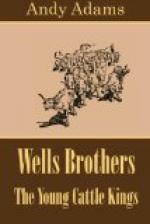The trail foreman rode away to overtake his herd, and Joel and Manly busied themselves in locating the new cattle. Dell and Sargent accompanied the last Lovell herd into the ranch that evening, and it proved to be the rear guard of trail cattle for that summer.
The ranch was set in order for the present. The dead-line was narrowed to a mile, which admitted of fully half the through cattle watering at the beaver ponds around headquarters. The new remuda, including all horses acquired that summer, to the number of eighty head, was moved up to Hackberry Grove and freed for the year. The wintered horses furnished ample saddle mounts for the present, there being little to do, as the water held the new cattle and no herding was required. The heat of summer was over, the water held in tanks and beaver dams, and the ranch settled down in pastoral security.
Under the new outline for the winter, an increased amount of forage must be provided, as in riding lines two grain-fed horses to the man was the lowest limit in mounting all line-riders. Machinery was available on the railroad, and taking a team, Joel returned with a new mowing machine, and the matter of providing abundant forage was easily met. Sufficient hay, from a few bends of the creek, in dead-line territory, supplied the home ranch, and a week’s encampment above Hackberry Grove saw the site of the new line-camp equipped with winter forage.
While engaged on the latter task, a new feature was introduced on Wells Brothers’ ranch. A movable commissary is a distinct aid to any pastoral occupation, and hence the wagon becomes a cowman’s home and castle. From it he dispenses a rough hospitality, welcomes the wayfarer, and exchanges the chronicle of the range. The wagon, which had been acquired with the new herd and used on the above occasion, was well equipped with canvas cover, water barrels, and a convenient chuck-box at the rear. The latter was fitted with drawers and compartments as conveniently as a kitchen. When open, the lid of the box afforded a table; when closed, it protected the contents from the outer elements. The wagon thus becomes home to nomadic man and animal, the one equal with the other. Saddle horses, when frightened at night, will rush to the safety of a camp-fire and the protection of their masters, and therefore a closer bond exists between the men of the open and their mounts than under more refined surroundings.
Early in September a heavy rain fell in the west, extending down the Beaver, flushing the creek and providing an abundance of running water. It was followed by early frosts, lifting the dead-line and ushering in Indian summer. With forage secure, attention was turned to the cattle. The purchase of a mowing machine had exhausted the funds derived from the sale of peltry, and a shipment of cattle was decided on to provide the munitions for the coming winter. The wagon was accordingly provisioned for a week, the blankets stored in the commissary,




